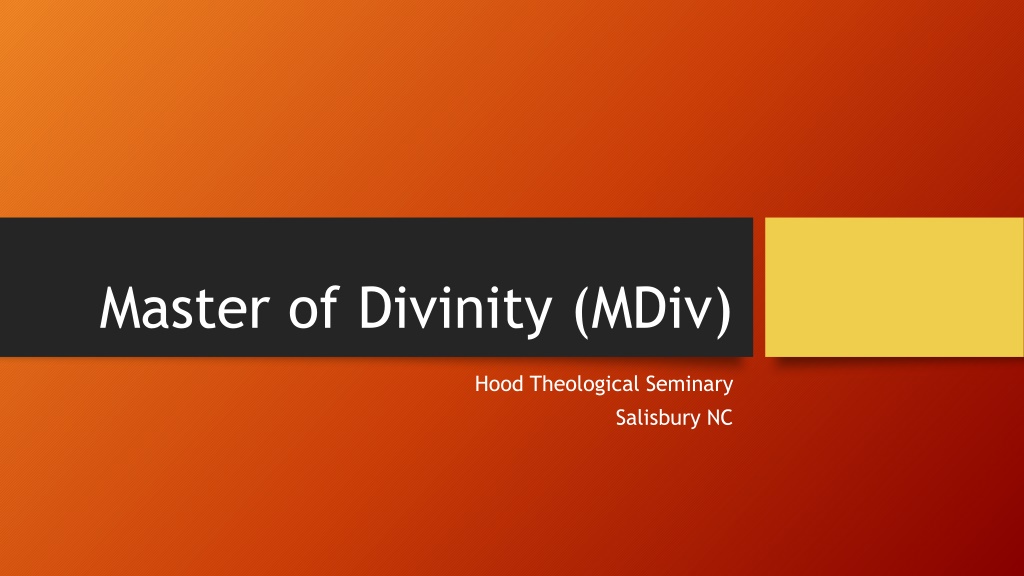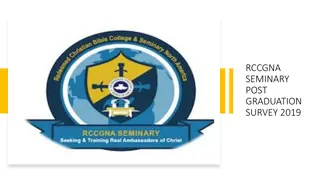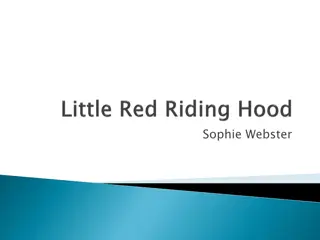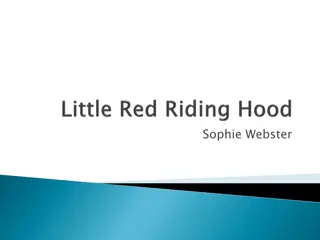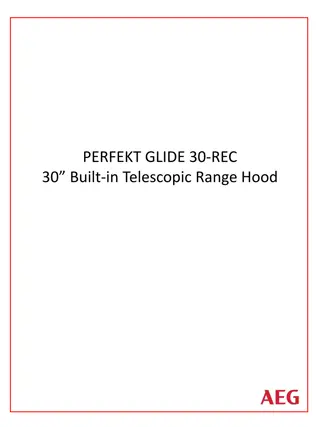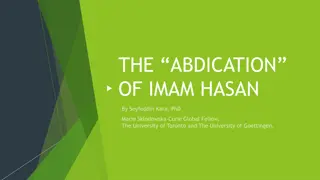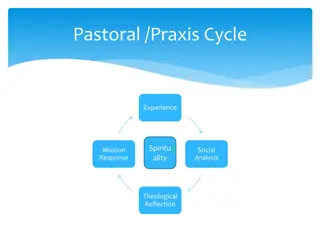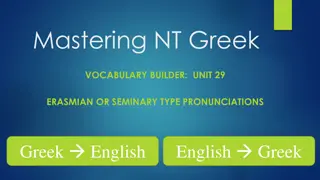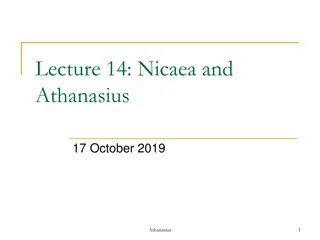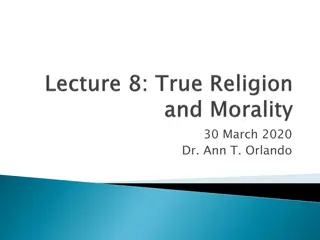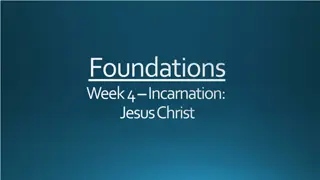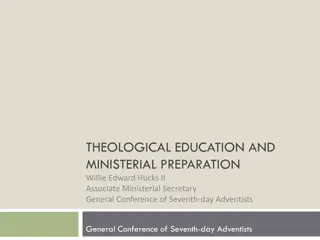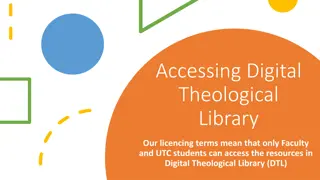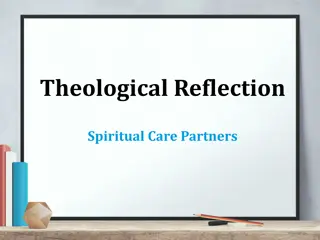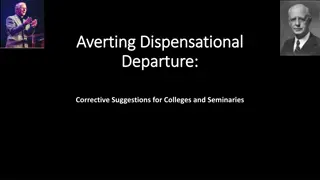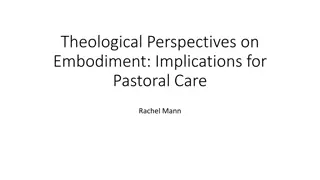Master of Divinity (MDiv) Program at Hood Theological Seminary
The Master of Divinity (MDiv) program at Hood Theological Seminary in Salisbury, NC, offers a comprehensive curriculum focused on biblical studies, history of Christianity, theology and ethics, and pastoral theology. With a duration of 84 credit hours, students delve into interpreting biblical texts, understanding Christian history, exploring theological concepts, and honing pastoral skills to serve diverse communities effectively and ethically.
Download Presentation

Please find below an Image/Link to download the presentation.
The content on the website is provided AS IS for your information and personal use only. It may not be sold, licensed, or shared on other websites without obtaining consent from the author. Download presentation by click this link. If you encounter any issues during the download, it is possible that the publisher has removed the file from their server.
E N D
Presentation Transcript
Master of Divinity (MDiv) Hood Theological Seminary Salisbury NC
Description The Master of Divinity (MDiv) provides students with foundational knowledge in disciplines essential to the practice of ordained ministry and enables students to interpret and apply it to their own ministries and cultural contexts in relevant ways.
Duration The Master of Divinity (MDiv) at HTS is an 84- credit hour degree program. The MDiv may be completed in a minimum of 3 or a maximum of 10 years.
Four Areas of Study There are four main areas of study in the MDiv program: Area One: Biblical Studies Area Two: History of Christianity Area Three: Theology and Ethics Area Four: Pastoral Theology
Area One Learning Objectives In Biblical Studies students will gain exposure to the languages in which the biblical texts were composed learn to interpret biblical texts within their literary, historical, and cultural contexts discern the significance of biblical texts for today s faith communities
Area One Required Courses BST 103: Introduction to the Old Testament I BST 104: Introduction to the Old Testament II BST 112: Introduction to the New Testament I BST 113: Introduction to the New Testament II
Area One Exegesis Requirement Students may fulfill this requirement by passing an Exegesis Seminar with a grade of C or higher or writing an acceptable exegesis paper in BST 112, BST 113, or any other designated Area One elective course
Area Two Learning Objectives In History of Christianity students will identify and engage significant figures, developments, and movements within the history of Christianity gain an understanding of how Christianity related to other religious groups discern how race, gender, class, and ethnicity have influenced the historical development of Christianity acquire competence in interpreting historical texts and understanding their value for modern Christians
Area Two Required Courses CHT 115: History of Christianity in Global Context CHT 200: History of Religion in the United States
Area Three Learning Objectives In Theology and Ethics students will deepen their awareness of the major currents of thought informing the contemporary church s witness to the good news concerning Jesus Christ discern the ways these currents are informed by the Bible, handed down through tradition, clarified by reason, and illumined by experience analyze the relationship between theology, philosophy, culture, and ethics and articulate the way these both interact and ought to interact in their present and future ministry settings
Area Three Required Courses TSE 110: Systematic Theology I TSE 111: Systematic Theology II TSE 120: Christian Ethics
Area Four Learning Objectives Pastoral Theology courses help students develop skills, methodological theories, techniques, and leadership abilities for the various ministries of the church.
Area Four Required Courses PTH 109: Introduction to Theological Education PTH 103: Worship and Preaching I PTH 380: Worship and Preaching II PTH 141: Pastoral Care and Counseling PTH 162: Supervised Ministry I PTH 163 Supervised Ministry II
Area Four Christian Education Requirement Students may fulfill this requirement by passing, with a grade of C or higher, one of the following courses: PTH 120: Foundations of Christian Education PTH 122: Teaching and Learning in Ministry PTH 220: Practices for Faith Formation PTH 221: Christian Education in the African American Church PTH 223: Christian Symbolism as a Faith Nurturing Tool
MDiv Concentrations MDiv students at HTS have the option of concentrating in 1 or 2 of the following areas of study. Biblical Studies History of Christianity Theology and Social Ethics Preaching and Worship Pastoral Care and Counseling Christian Education Students in good academic standing may declare a concentration after completing at least 18 credit hours. To receive a concentration students must complete 12 elective course credit hours in their declared area(s) of concentration with grades of B- or higher.
AME Zion Courses AME Zion MDiv students at HTS should plan to take the following elective courses while at HTS: CHT 110: AME Zion History PTH 135: AME Zion Polity PTH 130: Church Administration and Organization
United Methodist Courses United Methodist MDiv students at HTS should plan to take the following elective courses while at HTS, in addition to any other course(s) their Annual Conferences require for ordination: PTH 150 History and Foundation of Christian Evangelism 3 Hours (offered fall of even years) TSE 101 The Mission of the Church in the World (offered fall of even years) 3 Hours PTH 232 United Methodist History & Doctrine 3 Hours (Offered in conjunction with The Candler School of Theology at Emory University) PTH 233 United Methodist History & Polity 3 Hours (Offered in conjunction with The Candler School of Theology at Emory University)
MDiv Recommended Course Sequences HTS has developed 2 recommended course sequences a 3 year and a 4 year for students wishing to graduate in those number of years to follow. See the 2021-22 HTS Catalogue for details and/or ask your faculty advisor about them.
